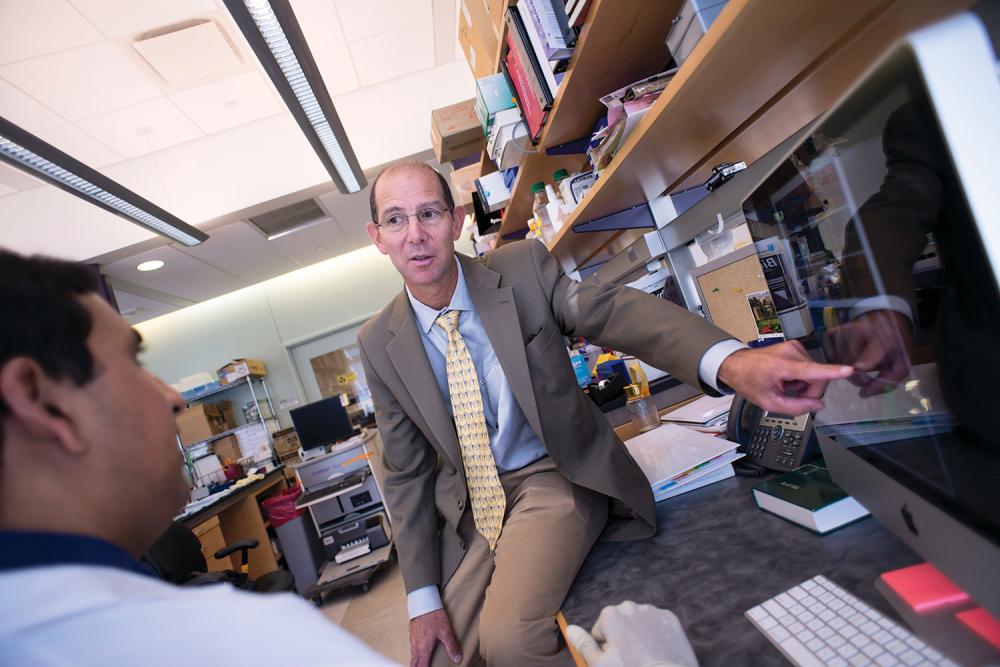Three researchers at NYU Langone Health were jointly awarded a $12 million, 5-year grant from the National Heart, Lung, and Blood Institute (NHLBI) of the National Institutes of Health (NIH) to study the role of the immune cells known as macrophages in obesity, diabetes, and atherosclerosis. Under the leadership of cardiologist Edward A. Fisher, MD, PhD, MPH, the Leon H. Charney Professor of Cardiovascular Medicine, immunologist Kathryn J. Moore, PhD, the Jean and David Blechman Professor of Cardiology, and endocrinologist Ann Marie Schmidt, MD, the Dr. Iven Young Professor of Endocrinology, will collaborate to pinpoint factors that activate or repress macrophage inflammatory activity in each disease. Although macrophages are normally beneficial, serving as the immune system’s first responders against dangerous pathogens, these same macrophages can become the body’s worst enemy when an individual becomes obese and develops diabetes or atherosclerosis. “Instead of taking a protective role, the macrophages become inflamed and exacerbate the damage caused by the disease,” Dr. Fisher says.
Additionally, Dr. Moore, who is also a professor of cell biology, received the NHLBI’s Outstanding Investigator Award, which is designed to provide NHLBI-funded investigators increased freedom to conduct research that breaks new ground or extends previous discoveries in new directions. The award allows investigators to take greater risks and pursue research that requires a longer timeframe.
Dr. Schmidt was also awarded Strategically Focused Research Network in Obesity funding from the American Heart Association. Together with Ira J. Goldberg, MD, the Clarissa and Edgar Bronfman, Jr. Professor of Endocrinology, and Mary A. Sevick, ScD, RN, professor of population health, the group will seek to discover the inflammatory and metabolic stimuli that thwart optimal weight loss after surgical or medical interventions. Dr. Fisher and Sean P. Heffron, MD, instructor of medicine, are key collaborators in this work.
NYU Langone Scientists Zero in on Mechanism for Removing Arterial Plaque
When low-density lipoprotein deposits form along the walls of coronary arteries, immune cells known as monocytes rush toward them. At the deposit site, monocytes either become M1 macrophages that worsen the inflammatory response or M2 macrophages that dampen inflammation.
In research published in the Journal of Clinical Investigation in June 2017, Dr. Fisher, who is also the director of the Marc and Ruti Bell Vascular Biology and Disease Program, along with his team shed light on the process by which monocytes develop into these specific types of macrophages, and how they might be directed to become the healing M2 variety. Their research confirmed that timing is everything: When monocytes arrive in plaques that are regressing, they become M2 macrophages, helping to control inflammation and prevent plaque rupture.
Surprisingly, Dr. Fisher and his team found that Ly6Chi monocytes, a monocyte subset previously thought to contribute only to plaque progression and inflammation, can take on the M2 macrophage role of regressing and resolving inflammation. They are now focusing on therapeutic candidates to stimulate this process, including immune signaling proteins interleukin-4 and interleukin-13. They are also experimenting with nanoparticles inspired by high-density lipoprotein.
“We need the next generation of drugs to go beyond cholesterol lowering to address the immune reaction to accumulated cholesterol, and to dismantle plaques as part of reversing or regressing mature disease,” Dr. Fisher says.
Leducq Foundation to Fund NYU Langone Research on the Sodium Channel
Half of all deaths from coronary artery disease are related to sudden cardiac death, often because of an underlying cardiac arrhythmia. Normal cardiac rhythm is governed by an organized, regular wave of electrical signals, and the response of cardiac cells to these signals is largely determined by those cells’ sodium channels. Despite its importance, surprisingly little is known about the sodium channel, and why it is so susceptible to dysfunction in heart disease.
Mario Delmar, MD, PhD, the Patricia M. and Robert H. Martinsen Professor of Cardiology and professor of cell biology, has been named the North American coordinator of a major new Transatlantic Network of Excellence in Cardiovascular Research sponsored by the France-based Leducq Foundation. The Leducq Foundation provides $6 million over 5 years to teams of researchers working collaboratively in the areas of cardiovascular and neurovascular disease. Dr. Delmar and his group, including Glenn I. Fishman, MD, the William Goldring Professor of Medicine, will focus on mapping the composition and function of the sodium channel in various types of cardiac cells. After elucidating the role of the sodium channel, they will work to develop small molecules that can modify adversely altered channels, with the ultimate goal of providing treatments to prevent sudden cardiac death.
Efficacy of Renin Angiotensin System Inhibitors for Coronary Artery Disease
Current guidelines advise the preferential use of renin angiotensin system inhibitors (RASi) in all patients with stable ischemic heart disease, but the evidence does not support this blanket recommendation over other antihypertensive agents, according to an analysis published in British Medical Journal in January 2017 by NYU Langone Health investigators. Led by Sripal Bangalore, MD, associate professor of medicine, the group reviewed 24 trials involving more than 60,000 patients who were followed for an average of 3.2 years. They found that RASi drugs reduced cardiovascular events and all-cause mortality in comparison with placebo groups, but not when compared with active control groups for all primary outcomes, including all-cause mortality, cardiovascular death, myocardial infarction, stroke, angina pectoris, and heart failure.
Gene Deletion Causes Temperature-Sensitive Cardiac Conduction Failure
Although fever is part of the immune system’s defense system against infection, it can also cause life-threatening changes in heart rhythm. Dr. Fishman, director of the Leon H. Charney Division of Cardiology, and David S. Park, MD, assistant professor of medicine, have described a key regulator of cardiac cell electrical signals that protects against these irregular rhythms: Fibroblast growth factor homologous factor 2 (FHF2), which is known to modulate the response of cardiac muscle cells to electrical signals. In mice genetically modified to lack FHF2, the investigators found that a core body temperature increase of as little as 3 degrees Celsius caused progressive and life-threatening heart conduction slowing, a condition that reversed by returning to normal body temperatures. The group also identified sodium channel inactivation as the mechanism behind this effect. The research was published in Nature Communications in October 2016.


